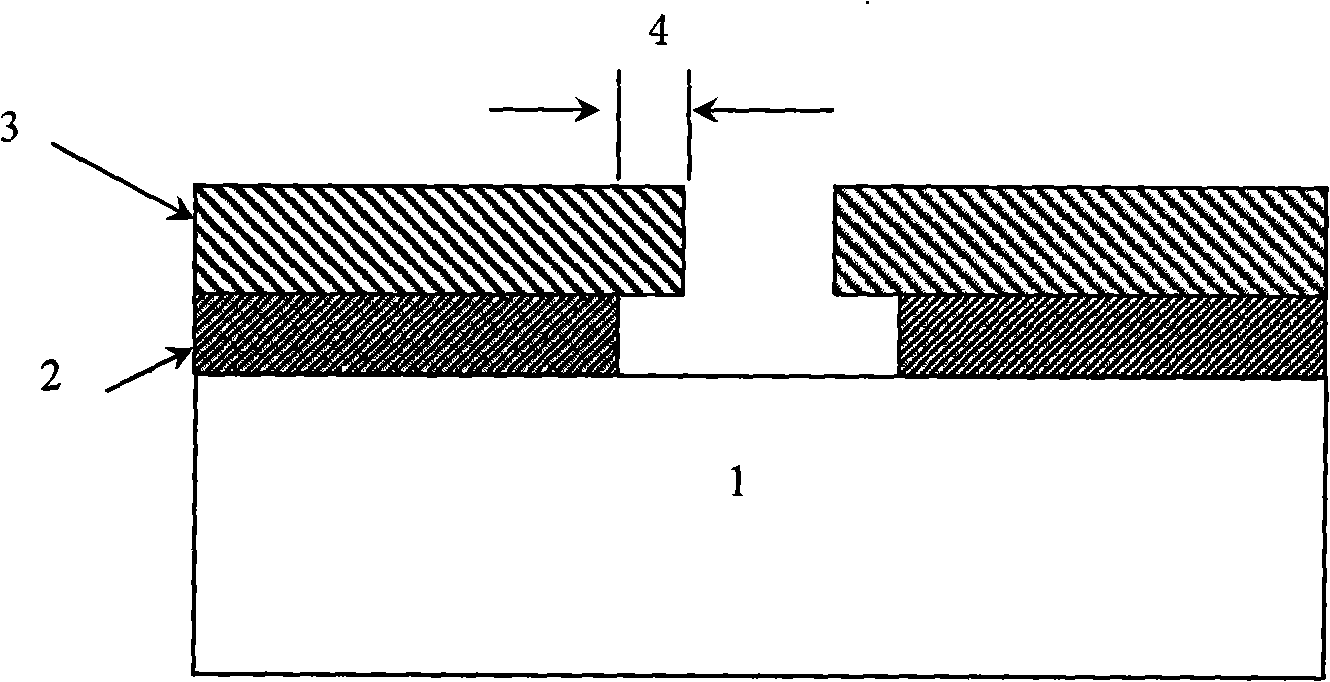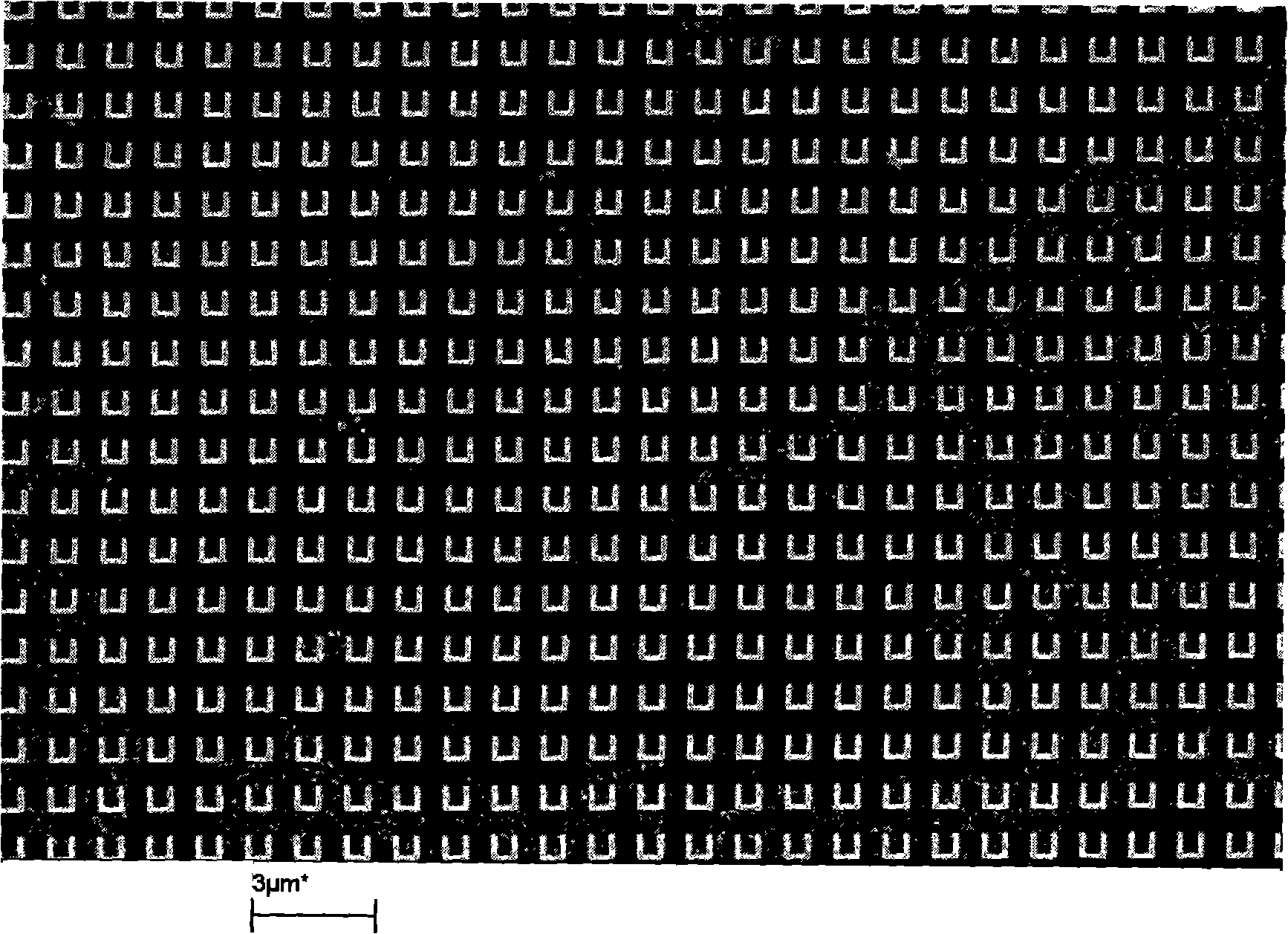Method for producing nano-structure on insulated underlay
A nanostructure technology on an insulating substrate, which is applied in the direction of optomechanical equipment, pattern surface photolithography, semiconductor/solid-state device manufacturing, etc. It can solve problems such as pollution, sample contamination, and change of material properties, and achieve assisted dissolution The effects of craftsmanship, precise implementation, and increased flexibility
- Summary
- Abstract
- Description
- Claims
- Application Information
AI Technical Summary
Problems solved by technology
Method used
Image
Examples
Embodiment 1
[0031] Embodiment 1, the method for making nanostructures on insulating quartz glass, comprising the following steps:
[0032] 1. Select insulating quartz glass as the substrate, select 0.8mm double-sided polished quartz glass as substrate 1, and use acetone, alcohol and deionized water in sequence, after ultrasonic cleaning, dry with dry nitrogen, and put it at 95 ℃ Bake on the hot plate for two hours and set aside;
[0033] 2. Using thermal evaporation coating equipment, deposit a layer of 80nm aluminum film 2 on the above baked quartz glass substrate 1, and then spin-coat a layer of electron beam resist with a thickness of about 140nm on the aluminum film 2 Agent 3, the electron beam resist is made of PMMA 495 glue purchased on the market, and the spin coating speed is 4000 rpm; after spin coating, a hot plate at 180°C is used to pre-bake the sample, and the pre-baking time is 65 seconds;
[0034] 3 Design of nanostructure pattern: According to the size and shape of the U-...
Embodiment 2
[0041] The preparation method of the present embodiment is the same as in Example 6, except that the conditions are as follows:
[0042] Fabrication of nano-copper electrodes on substrate 1 of insulating sapphire: 1 mm thick double-sided polished sapphire was cleaned by ultrasonic with acetone, alcohol and deionized water, dried with dry nitrogen, and then baked on a hot plate at 115 °C for two hours . A layer of 120nm aluminum film 2 was deposited on the sapphire substrate using magnetron sputtering coating equipment, and then a layer of electron beam resist 3 with a thickness of about 120nm was spin-coated on the aluminum film 2. The electron beam resist Use commercially available PMMA950 glue. After spin coating, the samples were pre-baked in an oven at 180°C for 30 minutes. The sample was then exposed using an electron beam exposure system. Exposure patterns were edited by GDSII software, including line structures with a minimum line width of 60 nm. Exposure parameters...
Embodiment 3
[0044] The preparation method of the present embodiment is the same as in Example 6, except that the conditions are as follows:
[0045] Fabrication of nano-gold electrodes on substrate 1 of insulating glass: After cleaning the 0.5 mm thick glass substrate with acetone, alcohol and deionized water with ultrasonic and blowing it dry with dry nitrogen, bake it on a hot plate at 180°C for 20 years. minute. A layer of 60nm aluminum film 2 was deposited on the sapphire substrate using magnetron sputtering coating equipment, and then a layer of electron beam resist 3 with a thickness of about 200nm was spin-coated on the aluminum film. Commercially available ZEP520 glue. After spin coating, the samples were pre-baked on a hot plate at 200°C for 2 minutes. The sample was then exposed using an electron beam exposure system. The exposure pattern is edited by L-edit software, including the line structure with a minimum line width of 80nm and a minimum line spacing of 150nm. Exposure...
PUM
| Property | Measurement | Unit |
|---|---|---|
| width | aaaaa | aaaaa |
| thickness | aaaaa | aaaaa |
| thickness | aaaaa | aaaaa |
Abstract
Description
Claims
Application Information
 Login to View More
Login to View More - R&D
- Intellectual Property
- Life Sciences
- Materials
- Tech Scout
- Unparalleled Data Quality
- Higher Quality Content
- 60% Fewer Hallucinations
Browse by: Latest US Patents, China's latest patents, Technical Efficacy Thesaurus, Application Domain, Technology Topic, Popular Technical Reports.
© 2025 PatSnap. All rights reserved.Legal|Privacy policy|Modern Slavery Act Transparency Statement|Sitemap|About US| Contact US: help@patsnap.com


